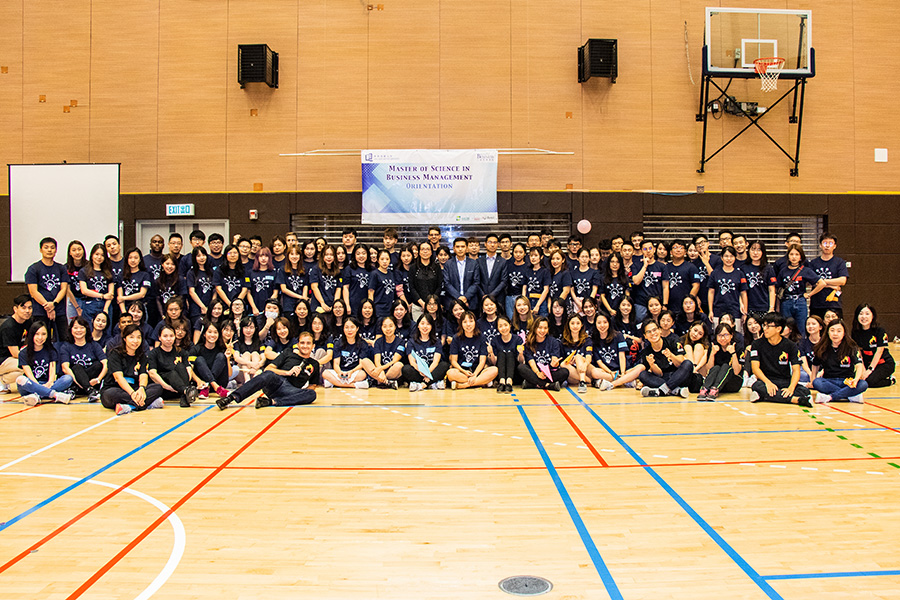Curriculum
Learning Goals


Transdisciplinary Knowledge
Students will develop a core understanding of transdisciplinary business knowledge in the era of digital transformation.


Global Mindset
Student will cultivate a global mindset with cultural diversity as a competitive advantage.


Managerial Skills
Students will demonstrate crucial managerial and analytical skills, effective communication, adept planning and execution of business tasks in a collaborative environment.


Sustainable Practice
Students will cultivate ethical and social sustainable responsible practices in diverse business and society contexts.
Programme Structure
The MScBM Programme consists of 12 courses (equivalent to 36 units) : 8 core courses, 2 required courses and 2 elective courses.
Under special circumstances, students may take a maximum of 2 courses from the School's specialised Master's Degree programmes to replace the 2 elective courses.


This course stresses the systematic generation and analytical use of accounting information from the perspective of business management. Accounting information aid managers in critical business activities like operational planning, performance evaluation, governance controls, and regulation compliance. This course will cover topics of financial accounting and management accounting. Financial accounting topics include the accounting cycle and financial statements for external reporting. Management accounting topics include activity-based costing, relevant costing, capital budgeting, and investment decisions.
This course provides students with a full and practical introduction to entrepreneurship with a strong emphasis being placed on the development of new ventures in the commercial world. Adopting a practitioner’s stand, the scope of this course covers the process of corporate and individual entrepreneurial undertakings including, but not limited to, business plan development, venture team building, business model development, business feasibility, resource allocation, and the valuation of ventures. Furthermore, students will learn how to examine and assimilate the knowledge of the seminal work and the latest scholarly journals into their studies.
The objective of this course is to enrich students’ understandings of real-world business issues and to broaden students’ practical knowledge on the impact of the disruption of technology, so that they can be future-ready and ethical leaders.
By means of seminars and workshops, students will be able to effectively understand the latest development in Digital Transformation, Entrepreneurship and United Nations Sustainable Development Goals (SDGs) and develop essential managerial competencies.
Senior management-level practitioners, industry leaders and experts will be invited as guest lecturers to provide valuable industry insights to supplement the theoretical knowledge learnt from the program.
The course introduces economic theory necessary for sound business decision making, and enable students to evaluate the business environment as well as the effects of the latest wave of innovations and technology breakthrough in digital economy for making favorable business decisions.
Upon finishing the course, students are expected to apply economic models for business analysis and decision making, and to project the potential changes and evolvement in business environment. In order to enable students to keep abreast of the latest market environment, application of the business economics knowledge that addresses specifically the issues in the digital era under big data, blockchain and innovation environment would be covered.
In this course, Environment, Social, and Governance (ESG) impacts on risk and return of investment will be identified. Different ESG investment approaches and strategies will be addressed and an understanding of ESG integration will be provided on how ESG will be embedded in the investment process and in valuation models. Sustainable Investing across asset classes will be discussed and different ESG Reporting standards will be assessed.
Students that finish the course will be prepared for the “Certified ESG Analyst (CESGA)” certification by EFFAS (The European Federation of Financial Analysts Societies).
This course introduces the basic concepts and techniques in making investment and financing decisions. It enables students to evaluate some basic investment options, understand how corporations finance their investments, and appreciate different capital structure. It also covers the basic concept on corporate governance.
The Course is designed to provide students with a deep understanding of how technology and digital advancements transform the field of people management. Students will explore the impacts of digitalization on individual and group behaviors within organizations, as well as the implications for leadership and organizational design.
Relevant issues including cross-cultural communication and ethical implications relating to people management in the context of digital transformation will also be covered.
The Course, consisting of both lectures and mini-lectures, will be delivered through a combination of lecturette, case studies, group discussions and blended learning activities.
The objective of this course is enable students to develop a disciplined approach to the analysis of market situations and decision making. The orientation is managerial and real life applications will be emphasized. Taking a holistic view, emphasis is on the entire marketing program and the global environment in which it operates so that students can develop the skills required to make optimal marketing decisions.
This immersive field study empowers students to explore a location of current and significant business value, with a particular emphasis on sustainable business practices. The selection of the location is a collaborative decision led by the Programme Director, involving consultations with PMC members and student representatives. The chosen location can be any city or country worldwide.
Armed with key insights into the selected location, including its business environment and the background of the firms/organizations to be visited, participating students are tasked with producing both group and individual reports. This hands-on experience equips students with practical knowledge and analytical skills, bridging the gap between theoretical learning and real-world business scenarios.
This course aims to complement theoretical perspectives with empirical research evidence, providing students with a well-rounded understanding of the subject matter. Through this, students gain the ability to bridge theoretical concepts with real-world applications. Besides, the course guides students in conducting empirical research, fostering a hands-on approach to learning. This practical aspect not only enhances research skills but also encourages critical thinking and problem-solving in a research context.
As part of this exploration, students are tasked with identifying pertinent industry issues and formulating policy recommendations. These recommendations are not only rooted in academic literature but are also supported by empirical evidence, providing a comprehensive and informed perspective.
In addition to its overarching objectives, the course places emphasis on three key themes:
- Entrepreneurship: Exploring the dynamics of entrepreneurship, the course delves into the principles, challenges, and opportunities within entrepreneurial endeavors, preparing students to analyze and contribute to entrepreneurial ecosystems.
- Digital Transformation: With a focus on the rapidly evolving digital landscape, the course addresses the impacts and implications of digital transformation on businesses and industries. Students gain insights into leveraging digital technologies for strategic advantage.
- SDG and/ or ESG: Recognizing the importance of sustainability in contemporary business practices, the course incorporates the study of SDGs and/or ESG criteria. This theme encourages students to explore responsible business practices and the integration of sustainability principles into corporate strategies.
Students, working in groups of 3 (and 4 for exceptional cases with prior approval from the Course Co-ordinator), will be assessed according to the depth and width of their analysis, the appropriateness, feasibility, and cost-effectiveness of their recommendations and the implications on implementation and stakeholders
In the 21st century emerging technologies are transforming the economy and businesses rapidly. Also businesses are being disrupted by digital platforms and financial technologies. This course aims to provide students with the knowledge and skills about the ethical dimensions and complex compliance obligations in the digital economy. Students would learn about the key ethical and regulatory considerations across a number of technologies that are driving the digital transformation. Some of the technologies and digital businesses covered in this course includes artificial intelligence (AI), block-chain, smart contracts, digital platforms and fintech. Students would learn to appreciate the ethical dilemmas that emerging and new technology impact on businesses and users. Students shall also be taught about how to establish a robust compliance management program to minimize companies’ legal risks.
This course provides students with a framework, tools, and techniques necessary to read, analyze and interpret financial statements, and ultimately value a company (its securities). The primary objective is to help students develop analytical skills with which to use financial information in a variety of performance evaluation and firm valuation contexts. The course covers a broad range of topics, including a thorough review of financial statements, profitability and credit risk analysis, analysis of key line items in financial statements, forecasting future performance, and various valuation techniques. Throughout the course, the concepts and techniques are explained and illustrated through reporting activities and business cases of real companies.
This course aims to provide students with an understanding of the legal framework related to the Hong Kong legal system, contract law and corporate governance. Related laws and regulations such as case law, the Sale of Goods Ordinance, Control of Exemption Clauses Ordinance, Companies Ordinance, the Securities and Futures Ordinance, the Listing Rules, the Code of Best Practice, and the Takeover Code will be covered. Other topics include the HK legislative process, the doctrine of judicial precedent, contract law: formation, validity, performance, and remedies for breach of contract, corporate governance: mergers and acquisitions; shareholders’ residual powers; protection of minority shareholders; types of directors; directors’ appointment, rotation, disqualification and removal; board of directors’ composition, meetings and duties; monitoring the board of directors; interests of other stakeholders such as individual and institutional shareholders, creditors and employees.
This course aims to provide opportunities for students to obtain real-life working experience relating to various business activities in organizations in Hong Kong and/or outside Hong Kong. Under the guidance of both faculty and workplace supervisors, students, working as interns, will complete 9 hours of lectures and a work assignment of no less than 90 hours, paid or not paid, depending on the prior agreement with the sponsor organizations.
Prior approval from the Course Co-ordinator is needed before a student can register for this elective. Students are also needed to attend interviews hosted by both respective sponsor organizations and the Course Co-ordinator.
Blockchain, as a promising disruptive technology that has the potential to reshape the business landscape, serves as a foundational technology for cryptocurrencies, smart contracts, and decentralized applications. The proliferation and advancement of disruptive technologies present companies with expanded opportunities to gain a competitive advantage. This course aims to introduce various blockchain-related technologies, such as Ethereum, non-fungible tokens (NFTs), smart contracts, and decentralized applications (DApps), as well as other disruptive technologies like high-performance computing, artificial intelligence (AI), and big data. It focuses on how these technologies can be leveraged to improve business performance and management.
Throughout the course, students will explore fundamental issues surrounding disruptive technologies, examine their applications in business, and also consider the potential downsides or challenges associated with these technologies. The learning experience will involve a combination of lectures, case studies, in-class exercises, group projects, and presentations. By enrolling in this elective, MBA students will enhance their technological literacy and stay informed about cutting-edge advancements that may significantly impact the business environment they will operate in.
Overall, this course provides a comprehensive understanding of blockchain and other disruptive technologies, empowering students to navigate the evolving business landscape with confidence and adaptability.
This course aims to provide the economic theories and models for students to understand the macroeconomic environment under the trend of globalization. In particular, the course covers topics in international trade, exchange rate and international capital movement. Current international economic issues such as trade protectionism, financial crises, and currency internationalization will be examined through the lens of international economics.
This course analyses different principles in the valuation of financial assets including common-, preferred stocks and bonds. The development of portfolio concepts and capital market theories are introduced. The issue of market efficiency is investigated while asset pricing models are discussed. Techniques on performance evaluation are introduced and performance of mutual funds is also examined. After completing this course, students should be able to perform sound investment and portfolio analysis.
This course aims to equip students with a comprehensive and profound understanding of Financial Technology’s core principles, preparing to navigate, contribute to, and thrive in this ever-evolving domain; prepare students to delve deeply into the dynamic intersection of finance and technology, exploring the revolutionary transformations shaping the world of global finance, banking, and financial services.
In this course, students will discover the disruptive potential of FinTech and Web3.0, revealing its power to redefine a multitude of financial sectors, including payments, capital raising, remittances, consumer banking, and B2B banking. In addition, students will be introduced to a myriad of innovative financial mediums such as micro-payments via mobile apps, P2P lending platforms, integrated social media spending, and the intelligence of robo-advisors optimizing investment decisions, among others.
Real-world case studies will be a cornerstone of this course’s learning approach, enhancing students’ understanding with practical insights and illustrating the transformative impact of disruptive technologies in creating a new, improved financial ecosystem. These carefully selected cases will not only unveil the intrinsic necessity driving the evolution of the financial landscape but also elucidate the practical methodologies and technologies underpinning this transformation.
Human Resource Analytics is a process to discover patterns in data and turn data into insights and actionable recommendations by making use of statistical techniques, computer programming skills and human resource (HR) domain knowledge.
HR is changing to be more data-driven. HR managers and practitioners are required to make evidence-based decisions by identifying and quantifying key people drivers to explain HR issues, predict trends and inform decision-making. Human resource analytics is an essential skill for making better strategic HR decisions.
This course aims to develop students’ knowledge, skills, and ability to diagnose, analyze, evaluate, predict, and make decisions using various HR and organization data and metrics. Students will learn various methods and techniques to collect data, hypothesize models and conduct analysis using statistical software to evaluate HR issues, make predictions and give evidence-based recommendations. Future development on human resource analytics will also be discussed.
Global Human Resources Management (GHRM) has been identified as a crucial factor in a firm’s international success. GHRM is more complex and varied than domestic HRM and incorporates a broader scope, and increased risk exposure as well as a change of emphasis. This course will examine environmental elements and the characteristics of GHRM. It will deal with the practical issues and consequences of the internationalisation of HRM.
Due to constant changes in the market, a corporation often needs to restructure itself in order to remain its own compatibility and success. At the same time, the corporate leader has a vital role in developing the organization to its next level of success. Leadership is a process of influence in which one enlists the assistance and support of others in achieving a planned goal. Thus, for a company to successfully implement any organizational change initiative, it is a must that effective leadership is developed and in place in order to get the job done. This course helps to increase the knowledge of the students on how leadership can be developed and its role in organizational development. The first part of this course includes various leadership theories approaches, models and skill sets. For the organizational development part, students will gain understanding on important determinants, key components, and success factors of an effective organization developmental process.
One key element of a successful business manager is the ability to draw lessons from failure and investigate the patterns of errors. This course examines failed business strategies that looked lucrative on the drawing board yet failed miserably in the real-world setting, and highlights the importance of critical thinking in the process of strategy forming.
We will apply a case study method and enquire the topic of failure on two levels. First, we will take a macro view and assess “failure” events from the strategic angle. The events appear to be isolated incidents, but upon closer examination reveal common themes such as poor liquidity management, runaway financial-leverage and disregard of regulatory parameters.
In the second part, we will shift the focus to individual actions in strategy delivery. Several established economic theories assume that people are rational decision makers. A growing body of research has however exposed flaws in this long-held assumption and highlights the role of cognitive deficiencies in strategic failure. We will explore how psychological factors like biased receptions of market signals impact the execution of business strategy, and conclude with a discussion on the role of critical thinking in shaping effective corporate strategies.
The course Design Thinking for Business Innovation emphasizes the importance of creativity and innovation as key drivers of growth in times of the innovation economy. The students learn how to use design thinking process to lead and manage innovation culture. Also learn and reliably develop and apply meaningful ideas for a business challenge using a systematic innovative design thinking model, its process method, and related thinking tools.
At the end of the course, the students will personally experience the creative power of systematically applying the structured innovative design thinking process method in a real case, thereby learning how to produce better insights and ideas for business success. Other topics discussed in the course are the interconnected relationship between the core concepts of creativity and innovation culture, and factors relating to innovation and creativity for individual and team.
The ability to adapt to change in the rapidly changing environment is a key for business survival in a landscape which are increasingly shaped by technological advancements such as artificial intelligence, digital transformation, distributed systems, and quantum computing. Modern managers are expected to be fully equipped with the tools, techniques, and knowledge about these changes as well as successfully in managing the organizational change. Technologies, especially that of advanced computational algorithms such as artificial intelligence is playing a pivotal role in driving organizational change and business sustainability. Ever since Peter Senge’s seminal work published in 1990, Learning Organization has taken up a unique position in modern management theories and techniques, especially, in managing organisational change. The course covers the theories and practices in organizational change management and learning organization as well as affording students a practical introduction to technology management such as AI in business applications. Course participants will be equipped with the fundamental knowledge in managing organizational change as well as applying learning organization theories as one of the managerial interventions in managing organizational changes in the era of AI and technological enabled business landscape.
The aim of this course is to provide students with the knowledge and skills needed to analyse and solve marketing communication problems at a strategic level, taking into account its impact on the firm as well as the local and global society.
Building a strong and enduring “brand” is becoming a top priority for many enterprises regardless of the nature and size of the businesses. Indeed, the brand is the most valuable asset of any organization since it is the ultimate differentiator that leads to customer loyalty. In other words, a company with a distinctive and robust brand will never have to compete on price alone, thus allowing it to maintain a healthy profit margin. This has awakened many senior executives to realize that branding is more than a marketing concept; it is, in fact, also a financial concept.
This course will examine all the fundamental branding principles and explore how to build a leading brand in the digital age and during uncertain times, including post-COVID-19 and the New Normal. Disruptive factors such as technology development, big data deployment, and the proliferation of social media and e-commerce have changed how we do business. Yet, the value of the brand has not diminished. On the contrary, corporations with distinctive, consistent, and relevant brands are more likely to acquire and retain profitable customers. Digital marketing will be thoroughly examined as it has become an inseparable part of brand-building these days.
On the other hand, with consumers expressing their escalating concern on environmental and social issues in our society, ESG has become a key topic on the corporate agenda on how to prosper a business sustainably. Hence, responsible corporations are now building brands not only on ideas but ideals. A holistic brand is much more than offering good products and services; it should stand for specific important values that contribute to a better world. Relevant cases and examples will be referenced across Asia and the world to allow the participants to draw valuable and practical insights into building their brands according to a global standard in this new era.
Finally, the concept of branding can be applied at a personal, corporate, and social level. As such, this course will bring tremendous value to the participants with any background and business focus. In a nutshell, this course aims to bridge the academic and business worlds and equip senior executives with a complete understanding of building and managing an enduring brand in an increasingly complex and sophisticated business environment.
Remarks: Elective courses will be offered subject to the availability of teaching resources and the number of student enrolments, while the course registration will depend on the availability of places.
Study Mode & Class Schedule


Full-time
1 year / Weekdays and Weekends
You can complete whole programme full-time in a year. However, students can choose to extend the normal study period by a summer or semester by participating in the International Exchange Programmes recognised by the School.
Medium of Instruction
English is the official medium of instruction. Some China business related courses may be taught in English and supplemented by Chinese.


